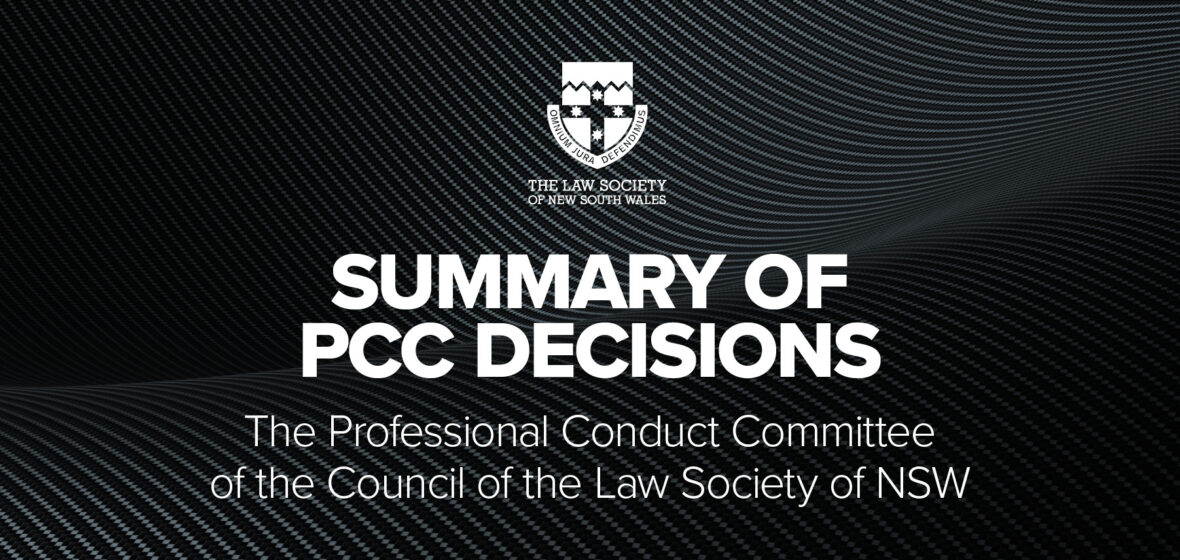Six matters were finalised this quarter by the Professional Conduct Committee (PCC).
The matters involved the following conduct issues:
· Providing legal advice without holding a practising certificate;
· Failures in relation to holding trust money;
· Failing to maintain proper trust account records;
· Breaches of undertakings;
· Failing to ensure that advertising is not misleading/deceptive; and
· Failing to act on a client’s instructions.
The following are some key principles emerging from the decisions.
Providing legal advice without holding a practising certificate
One matter concerned a solicitor providing legal advice to a client and charging for that legal advice, without a valid practising certificate. The advice provided required a degree of legal skill and experience and was not work of a clerical or administrative nature. The solicitor’s invoice to the client described the solicitor as a ‘lawyer’ and contained statements regarding payment of overdue interest under the Legal Profession Uniform Law (NSW) 2015 (Uniform Law) which is exclusive to invoices issued by solicitors.
The Uniform Law defines “engage in legal practice” as:
“includes practise law or provide legal services, but does not include engage in policy work…”
Whilst the Uniform Law does not include a definition of “practise law”, it provides a definition of “legal services” in s.6, which is “work done, or business transacted, in the ordinary course of legal practice”.
The PCC considered case law to assist it with the interpretation of what it means to “engage in legal practice” or “provide legal services” and decided that the services provided by the solicitor amounted to legal services.
The PCC decided that the conduct amounted to unsatisfactory professional conduct and:
· issued a reprimand;
· ordered the Solicitor to undertake an ethics course; and
· recommended to the Law Society Council that the solicitor not be entitled to practise as a
· principal for a period of 3 years.
Failures in relation to trust money
Another matter concerned a solicitor who was acting as stakeholder in a conveyancing matter. The solicitor released the deposit to his client despite being aware of a dispute between the parties regarding completion.
Section 138(1) of the Uniform Law provides that a law practice must—
“(a) hold trust money deposited in the law practice’s general trust account exclusively for the person on whose behalf it is received; and
(b) disburse the trust money only in accordance with a direction given by the person.”
The PCC also considered the comments made his Honour, Justice Darke, in Alicja Polbratek v Annross Partners Pty Limited trading as Centro Real Estate (2016) NSWSC 385 (Polbratek v Annross) at [13]:
“If a stakeholder considered that circumstances had arisen whereby one or other of the parties was entitled to the funds, the stakeholder could pay the funds to that party. However, the stakeholder would do so at its own risk that he or she may turn out to be wrong.”
Given that the solicitor was aware of a dispute between the vendor and purchaser, the PCC decided that adherence to the trust accounting provisions of the Uniform Law necessitated that the solicitor hold the trust money until such time as the dispute was resolved and a written direction had been provided by both parties, or a court order was obtained ordering the solicitor to release the trust money (in which case the solicitor could have paid the money into Court at the time proceedings were commenced).
The PCC decided that the conduct amounted to unsatisfactory professional conduct and ordered that the solicitor:
· be reprimanded; and
· was required to complete an accredited trust accounting course.
Breach of undertaking by solicitor
Another matter involved a solicitor that distributed the proceeds of a deceased estate in breach of an undertaking that had been given to another solicitor.
Rule 6.1 of the Conduct Rules provides:
“A solicitor who has given an undertaking in the course of legal practice must honour that undertaking and ensure the timely and effective performance of the undertaking, unless released by the recipient or by a court of competent jurisdiction.”
Solicitors should also note that it “it goes without saying, and is…perfectly clear trite law, that the breach of a professional undertaking given by a legal practitioner in the course of his/her practice, is regarded by the profession generally, the Law Society and this Tribunal, as a very serious matter” (see Council of the Law Society v Martin [2008] NSWADT 305).
Practitioners should note, that unless there is a “significant exculpatory matter or other prevailing considerations” a breach of an undertaking “will ordinarily per se constitute professional misconduct” (see Law Society of New South Wales v Berger, No 1 [2017] NSWCATOD 137).
The PCC decided that the conduct amounted to unsatisfactory professional conduct and ordered that the solicitor be reprimanded.
Failure to ensure that advertising not misleading or deceptive
Another matter determined this quarter, concerned the failure of a solicitor to ensure that a website and social media ‘news page,’ operated by their law practice, did not contain material that was misleading or deceptive or likely to mislead or deceive.
Rule 36.1 of the Conduct Rules provides, in part:
“A solicitor or principal of a law practice must ensure that any advertising, marketing, or promotion in connection with the solicitor or law practice is not—
36.1.1 false,
36.1.2 misleading or deceptive or likely to mislead or deceive…”
The PCC considered that the decision of the full Federal Court in Australian Competition and Consumer Commission (ACCC) v Employsure Pty Ltd (2021) 392 ALR 205, was relevant to the question of when advertising, marketing, or promotion in connection with a law practice is likely to mislead or deceive.
The PCC noted that the test is objective and the onus is on the principal of the law practice to ensure that any form of advertising/promotion is not misleading or deceptive or likely to mislead or deceive. Practitioners should note that the “number or proportion of reasonable users who were misled, or were likely to have been misled, does not matter for the purposes of establishing contraventions” (ACCC v Google LLC (No 2) (2021) FCA 367 at [17]).
The PCC decided that the conduct amounted to unsatisfactory professional conduct and ordered that the solicitor:
· be cautioned; and
· was required to undertake ethics training.
Failure to act on client’s instruction
Another matter concerned a failure by a solicitor to act in accordance with a client’s instruction to transfer the client’s documents and trust money to another law practice, after the solicitor’s retainer was terminated.
Rule 14.1.2 of the Conduct Rules provides:
“a solicitor with designated responsibility for a client’s matter, must ensure that, upon
completion or termination of the law practice’s engagement… a person authorised by the client or former client is given any client documents (or if they are electronic documents copies of those documents), as soon as reasonably possible when requested to do so by the client, unless there is an effective lien.”
The PCC noted that the solicitor ceased to have a lien over the client’s documents after the solicitor withdrew money from trust, in satisfaction of their outstanding legal costs, and had a duty to promptly facilitate the delivery of the documents and remaining trust money to the other practice.
The solicitor also had a duty to the Court to assist its management of the proceedings by promptly facilitating the other practice’s access to the documents.
The PCC decided that the conduct amounted to unsatisfactory professional conduct and ordered that the solicitor be reprimanded.




